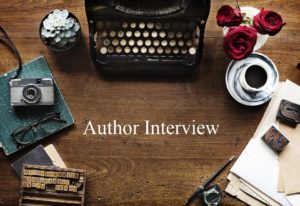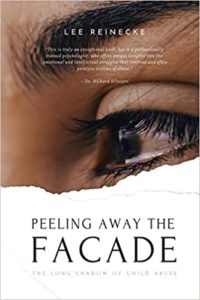An Interview with Lee Reinecke
 In April I received an email from an author requesting I read and review her book. So many generous folks have helped spread the word about my own writing, so I happily said yes. And I’m glad I did. Peeling Away the Facade: The Long Shadow of Child Abuse is Lee Reinecke‘s first book, a memoir. As the title suggests, it tackles the repercussions of child abuse and the long-term effects of her experiences, which stretch longer than the sunrise and sunset shadows. It’s an honest, often brutal look at how the human spirit can rebound from horrific experiences and the power that therapy and solid emotional support play in the healing process. Like the rest of us, Lee is active and busy; in addition to writing, “she volunteers as a spiritual mentor for middle school students at her church, with first-graders one day a week, and sews mittens and hats for the homeless.” Thankfully, she still had time to answer a few questions.
In April I received an email from an author requesting I read and review her book. So many generous folks have helped spread the word about my own writing, so I happily said yes. And I’m glad I did. Peeling Away the Facade: The Long Shadow of Child Abuse is Lee Reinecke‘s first book, a memoir. As the title suggests, it tackles the repercussions of child abuse and the long-term effects of her experiences, which stretch longer than the sunrise and sunset shadows. It’s an honest, often brutal look at how the human spirit can rebound from horrific experiences and the power that therapy and solid emotional support play in the healing process. Like the rest of us, Lee is active and busy; in addition to writing, “she volunteers as a spiritual mentor for middle school students at her church, with first-graders one day a week, and sews mittens and hats for the homeless.” Thankfully, she still had time to answer a few questions.
Christina: Your debut memoir, Peeling Away the Facade: The Long Shadow of Child Abuse, launched last month. What made you decide to write and publish your story? At any point in the process, did you doubt yourself?
Lee: Even though I had processed my experiences of childhood sexual abuse with three therapists and an incest survivor’s group and had worked with two counselors on the issue of marital infidelity, I continued to harbor anger and a sense of “unfinished business.” Several confidants had remarked that some aspects of my life were stranger than fiction, which led me to believe that writing the story might provide further clarity. As the pattern of revictimization became clear I developed a sense of mission, hoping that other assault survivors might be empowered after reading my account. I also want to raise the alarm over child sexual abuse so parents will educate their children about personal safety and boundaries.
Over the five years of writing this memoir, I often doubted that I had the courage to bring the book to fruition.
Christina: Many authors decide that a memoir like this is too raw and personal to share. Did you ever consider fictionalizing the story instead and marketing it as a novel? What made you continue ahead with the memoir?
Lee: In the first two years of writing there was a six-month period during which I considered writing this account as a novel. My writer’s group and I discussed advantages, such as persons depicted in the book having no grounds for libel suits and differences of opinion or recollection being waved off as fictionalized. After a great deal of soul-searching, I decided that the only way to tell my story was to use a pseudonym, to change all names, and to change geographical details.
I have been haunted by the possibility that my mother and sons, (who are unaware of the abuse) or former spouse will read the book and recognize that “this is us.” I disclosed a great deal of my shadow side in this work and shudder to imagine the consequences should my extended family, coworkers, and church family read the memoir. Four months before publication I panicked over the risk and was frozen in place for nearly a month. Members of the writing group, a beta reader, and my husband encouraged me to forge ahead.
In the end I decided that survivors of sexual assault have been silenced for decades about our experiences. Although I didn’t believe it was in my family’s best interest to publish the memoir using my legal name, I view the journey as worthwhile and offering hope to individuals who have undergone similar experiences.
Christina: What did you find to be the most difficult part of writing the memoir to be? The easiest? And would you share a little bit about your path to publication?
Lee: The most challenging aspect of writing this memoir was divulging my character flaws and the misguided decisions I’ve made. My healthier self now cringes and says, “Get out of there!” “Follow your gut instinct,” but at my worst I was functioning as a little girl and young woman who viewed herself as damaged and having limited options.
I found recounting the positive memories of my childhood and the births and raising of my children the easiest aspects of writing the memoir. Diving into family albums and mementos provided a sweet respite from the unsavory chapters of my life.
After my writer’s group critiqued my book, I had two beta readers go through it and provide feedback. I sent a chapter to three professionals for sample edits and selected the one who seemed the best fit. It was then time for a cover, internal formatting, and marketing. Reedsy provided a huge volume of craft webinars, the professional internal formatting, and an editorial review for this book. IngramSpark is printing the paperback and Kindle Direct Publishing is handling the ebook on Amazon.
Christina: You started your “career as a children’s protective social worker, then practiced as a licensed school psychologist for thirty-four years.” Did your choice of careers stem solely from your experiences? Have those careers helped in your healing process?
Lee: I’m a fan of Howard Gardner’s Theory of Multiple Intelligences; my strong modalities are interpersonal, linguistic, and music. I think I may have become a helping professional even if I had not been abused as a child, but my history propelled me into these fields. My professional training provided a plethora of information and strategies for coping with my issues and a receptive attitude about therapies that moved me from victim to survivor to victor.
Christina: In a recent blog post you state, “I want to mine painful nuggets, garner strength and hope from fellow sojourners, and share what we’ve learned.” Both your book and your blog posts meet that challenge. What is the most significant lesson you’ve learned from someone else?
Lee: I know a woman who was molested for years by her father. She married shortly after graduating from high school, but that relationship lasted only a couple of years. Her second husband, unbeknownst to her at the time of their marriage, had been a sexual perpetrator. She found living with him and mothering his child extremely difficult and left them for another man. After five marriages and thirty years of floundering, she found a therapist with expertise in sexual assault recovery and learned, in a community of women determined to thrive, that the abuse and its fallout were not her fault. She became an independent, assertive woman who lives a contented life on her own terms. Her example proves that we are not defined by our worst experiences, that it’s never too late to begin again.
Christina: Do you hope to write more books? If so, what’s next?
Lee: I’m currently working on a novel that is a bit of a sequel to my memoir. The protagonist’s desire for a stable, peaceful family life is thwarted by secrets in her husband’s past and challenges presented by the son of his first marriage. As the tale unfolds, ironic similarities in the couple’s families of origin seep to the surface.
Lee can be found in multiple places!
Website: leereinecke.com
Facebook: Lee Reinecke
Thanks to Lee for agreeing to this interview! If you know of an author who’d like to be featured in an interview (or you are an author who would like to be featured), feel free to leave a comment or email me via my contact page.

